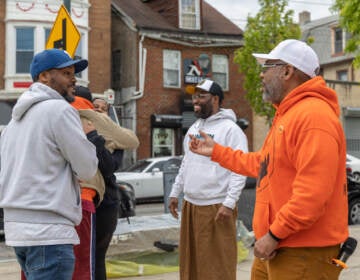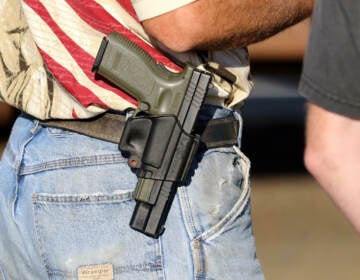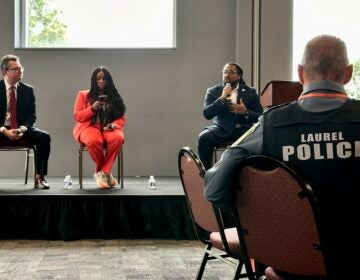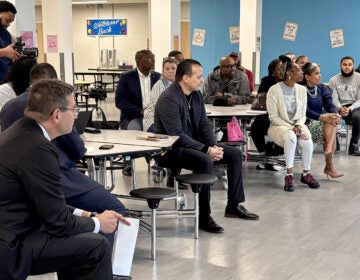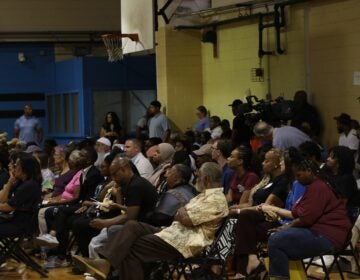Philly anti-violence grant program shows promising results, despite some hiccups, new evaluation shows
The report identified challenges that made it hard for some groups to complete their work — but city leaders promise to fix those problems before the next round of grants.
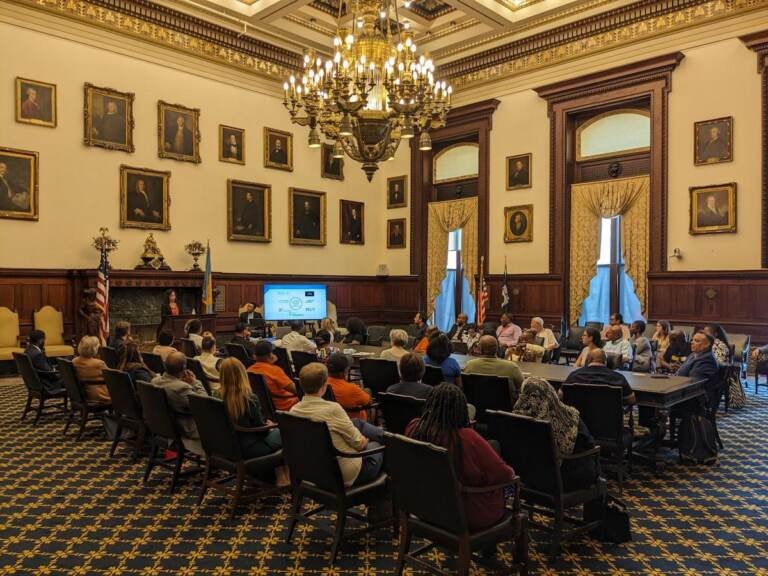
Community groups that received funds from the City of Philadelphia's Community Expansion Grant program met at City Hall to hear the results of a new evaluation on the program's success. (Sammy Caiola/WHYY)
A long-awaited evaluation of a Philadelphia anti-violence initiative that provides city funds to community organizations is showing some early, promising results.
The analysis found that most groups reached their intended audience, launched or expanded their services, and received positive feedback from their participants.
While the report did identify challenges that made it hard for some groups to complete their work, city leaders promise to fix those problems before the next round of grants gets underway.
The city of Philadelphia’s Community Expansion Grant (CEG) program was designed to help grassroots groups reduce shootings, particularly among Black and brown men ages 16 to 34. The program received $20 million from the fiscal year 2022 budget — $13.5 million to divide between 31 selected groups and the rest for administrative costs. Groups were given anywhere between $100,000 and $1,000,000 to execute projects focused on mentorship and trauma-informed healing by summer 2023.
The new report relied on data from 439 people who participated in programs run by 26 of the community groups. Organizations that received these grants reached a total of 4,381 participants during 2022. Two of the 31 groups dropped out of the CEG process, according to the report.
Three quarters of respondents were victims of or were impacted by gun violence, 72% were Black or Hispanic, 68% were male, and 55% were ages 16 to 34.
Of those participants:
- 75% felt safer in the community after participating in the program.
- 77% “improved their situation” after participating.
- 86% were satisfied with the program.
The numbers prove that grassroots organizations are worth investing in, said Brett Williams with Anti-Violence Partnership of Philadelphia.
“It works, it helps,” he said. “You’re seeing positive outcomes.”
He said the grant enabled his organization to hire more clinicians to help people who’ve directly experienced violence or lost someone to a shooting.
That’s in spite of the “red tape” that he and other nonprofit leaders said sometimes made it difficult to participate in the CEG process, such as groups needing to provide their own funds and then get reimbursed by the city.
“It was frustrating, but that’s part of something new,” Williams said. “Now we’re going into year two, hopefully the city has found different ways to get us through this process and get reimbursements faster as well.”
Researchers looked at the challenges of implementing CEG, and found that some organizations felt “disconnected, distrustful, and harmed” by the “white supremacist power dynamic that was created” by what groups described as excessive requests for evaluation activities, according to the report.
“We were getting emails and asked about going to meetings a lot, and I think for people who didn’t have the capacity to do that, that was a big challenge,” said Solomon Jones with ManUpPHL, which participated in the first cohort.
He said how well a nonprofit was able to access and use their CEG funding depended on their staff size and experience with large grants.
“You’re dealing with a lot of mom and pop organizations … you have to kind of bring them along to qualitative and quantitative analysis and data and training sessions,” he said. “All of these things that they might not know a lot about. But these are the organizations that are doing the work.”
Participants in programs run by the grantees had some complaints — such as being put on waitlists to participate, not receiving stipends for participating, or wanting more varied sports programming or the ability to go on field trips.
It’s too early to see whether the programs had an effect on rates of violence, said lead evaluation author Eve Weiss.
“But the foundation is being laid,” she said. “You saw programs being able to hire new staff, expand services, provide really needed care support.”
A second round of CEG grantees will begin their work later this year, and the program has been allotted $24 million in the latest version of the fiscal year 2024 budget. The city has already announced two dozen groups from the first cohort that have been renewed for round two. Additional grantees will be announced by the end of July according to Erica Atwood, the city’s deputy managing director of criminal justice and public safety.
“We do have a dedicated staff to our grant programs now,” she said. “We are going to consult with and work with the grantees to make this program a lot better.”
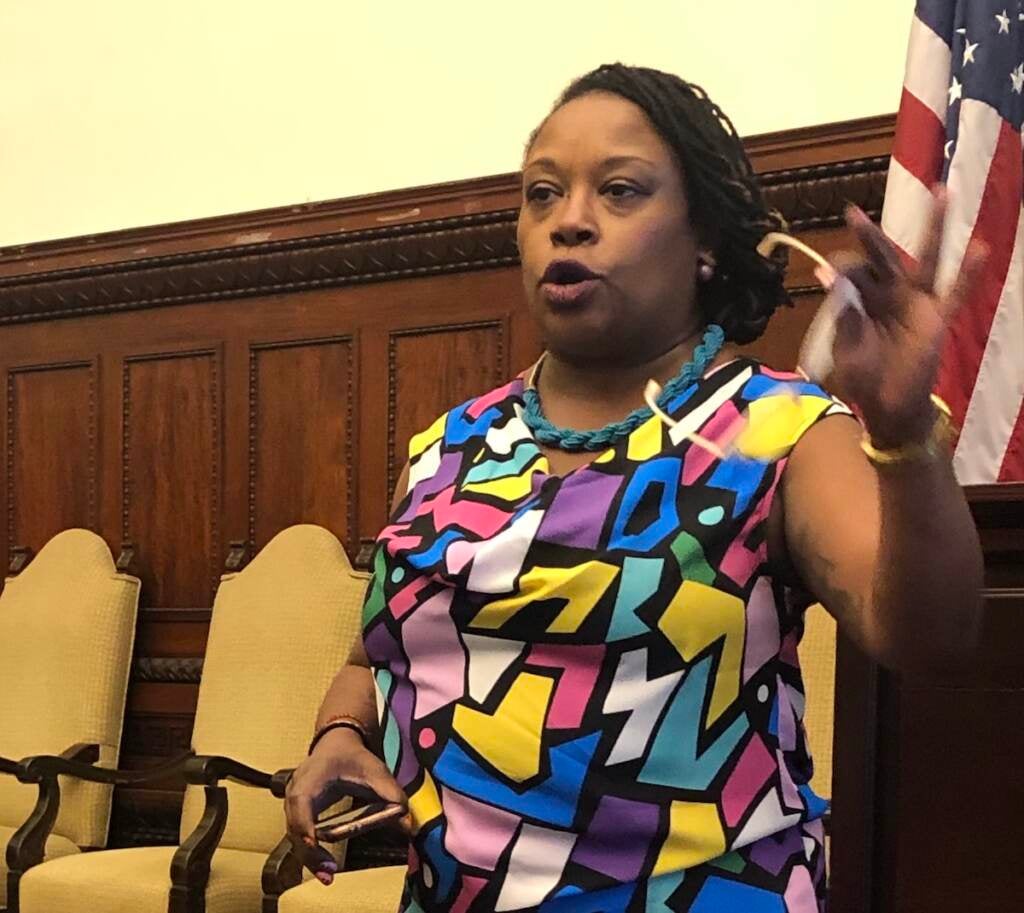
Atwood said she’s advocating for a new funding structure.
“You receive some portion of it upfront, and then there are benchmarks along the way,” she said. “We want to get our organizations accustomed to what is a standard practice of grantmaking. I don’t want this to be a reimbursable opportunity. That’s not realistic, and it’s not fair.”
She also wants to see multi-year funding, so groups can do their work over longer stretches without having to reapply.
CEG funding has faced scrutiny in the past — former Councilmember Allan Domb and former City Controller Rebecca Rhynhart both called on the city to evaluate whether CEG funding is being used effectively.
An April investigation from The Philadelphia Inquirer found that one group misused their funds and other groups struggled to manage the projects they proposed. Twenty groups requested extensions to complete their programs before the grant cycle ended in June, according to the Urban Affairs Coalition, the city’s fiscal sponsor responsible for distributing the funds.
Anton Moore with Unity in the Community, which used a CEG grant to expand its carpentry program for at-risk youth, said he supports the city’s efforts to improve the program.
“This grant wasn’t perfect, but it has the potential to be good because we’re out here saving lives,” he said. “We focused on trying to keep kids safe during the summer. How do we keep these kids alive past the summer?”
City leaders first announced this evaluation in January 2022. They commissioned four research entities to look at the program: Equal Measure, Evident Change, Cities United, and Research for Action.
In addition to the full evaluation, grantees will receive individual reports showing them what impact their programs had, and researchers will hold office hours to go over the results with groups.

Get daily updates from WHYY News!
WHYY is your source for fact-based, in-depth journalism and information. As a nonprofit organization, we rely on financial support from readers like you. Please give today.


